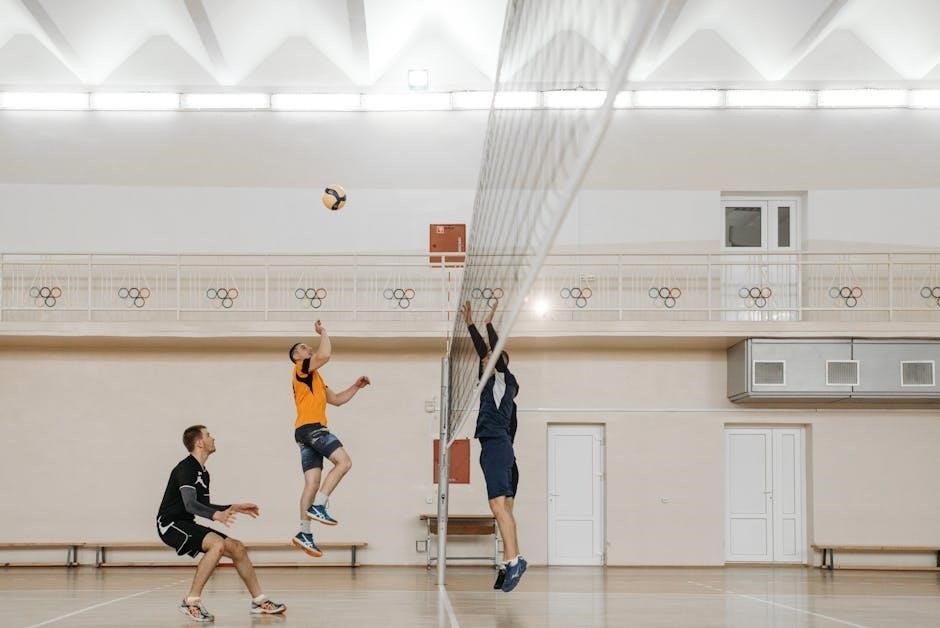Chess calculation is a vital skill for tournament players, enabling precise evaluation of positions and tactical execution. This guide offers structured techniques like the Burger Method to enhance decision-making and transform your gameplay effectively.
What is Chess Calculation?
Chess calculation refers to the systematic evaluation of positions and variations to determine the best moves. It involves analyzing material imbalances, tactical motifs, and strategic plans. Key techniques like the Burger Method and SPICE provide structured approaches to break down complex positions. Calculation helps players identify threats, opportunities, and hidden patterns, enabling accurate decision-making; It requires visualizing the board, predicting outcomes, and adjusting plans based on new information. Strong calculation skills allow players to outmaneuver opponents, convert advantages into wins, and avoid blunders. Effective calculation combines logic, intuition, and practice, making it a cornerstone of chess improvement. By mastering these methods, players can enhance their ability to navigate any position with confidence and precision, elevating their overall performance in tournaments and casual games alike.
Why is Calculation Important for Tournament Players?
Calculation is crucial for tournament players as it directly impacts their ability to win games. Accurate calculation helps players identify tactical opportunities, avoid blunders, and exploit opponents’ mistakes. In high-stakes tournaments, the margin between victory and defeat is often slim, making precise evaluation of positions essential. Strong calculation skills enable players to navigate complex variations, manage time effectively, and maintain composure under pressure. Furthermore, it allows players to adapt to different playing styles and respond to unexpected moves confidently. Without robust calculation abilities, even well-prepared strategies can falter, leading to missed chances and lost games. Thus, mastering calculation is a key factor in achieving consistent success and climbing the ranks in competitive chess. It is the backbone of tournament performance, separating good players from great ones.

Common Challenges in Chess Calculation
Players often face several challenges when improving their calculation skills. One major obstacle is the difficulty in visualizing multiple moves ahead, especially in complex positions. Time management during games also poses a challenge, as calculating deeply can lead to time trouble. Additionally, maintaining focus and avoiding mental fatigue is crucial, as prolonged concentration can hinder accurate evaluation. Another challenge is overcoming biases and assumptions, as players may overlook hidden tactical motifs or miscalculate variations. Furthermore, the pressure to perform in tournaments can exacerbate these issues, leading to stress-induced errors. Addressing these challenges requires structured training, such as the Burger Technique, and consistent practice to build resilience and precision in calculation. Mastering these skills is essential for tournament success and elevating one’s gameplay to the next level.

Fundamentals of Chess Calculation
Mastering fundamentals involves counting material, identifying tactical motifs, and calculating candidate moves. These core skills form the basis for precise evaluation and decision-making in chess.
Key Elements of Calculation
The key elements of calculation in chess involve a structured approach to evaluating positions. First, players must assess material imbalances, ensuring they understand the value of each piece on the board. Next, identifying tactical motifs such as forks, pins, and skewers is crucial, as these patterns often dictate the outcome of a position. Additionally, calculating candidate moves step-by-step is essential, as it allows players to anticipate consequences and uncover hidden threats. Visual or color systems can also be used to highlight pivotal pieces, making it easier to prioritize threats and opportunities. By mastering these elements, players develop a systematic method for decision-making, enabling them to play with greater precision and confidence. These foundational skills form the backbone of effective calculation, transforming raw talent into consistent tournament success.
Common Mistakes to Avoid
One of the most common mistakes in chess calculation is failing to identify tactical motifs, such as forks or pins, which can lead to missed opportunities or blunders. Players often overlook these patterns due to mental fatigue or rushed decision-making. Another mistake is overcomplicating positions, where players spend too much time analyzing irrelevant lines instead of focusing on the most critical threats. Additionally, many players neglect to verify their calculations, assuming their initial assessment is correct without double-checking. This can result in overlooked escapes or counterplay for the opponent. To avoid these errors, it is essential to adopt a systematic approach, such as the Burger Technique, which emphasizes clarity and precision in evaluating positions. By addressing these habits, players can significantly improve their calculation accuracy and overall performance in tournament play.
Building a Strong Foundation
Building a strong foundation in chess calculation begins with mastering basic principles and techniques. Players should start by understanding material imbalances, tactical motifs, and the importance of candidate move generation. The Burger Technique, as highlighted in the course, provides a structured framework for evaluating positions systematically. It emphasizes counting material differences, identifying key tactical patterns, and calculating variations accurately. Consistent practice and study of these elements are crucial for developing muscle memory and improving decision-making skills; Additionally, players should regularly review common checkmate patterns and basic endgames to ensure a solid understanding of fundamental concepts. By focusing on these building blocks, players can create a robust foundation that supports advanced calculation techniques and enhances overall performance in tournament play.

The Burger Technique
The Burger Technique is a structured approach to chess calculation, developed by CM Azel Chua. It involves counting material imbalances, identifying tactical motifs, and calculating candidate moves systematically to enhance decision-making accuracy.
Overview of the Burger Technique

The Burger Technique, developed by CM Azel Chua, is a systematic approach to chess calculation designed to enhance decision-making accuracy. It involves three key steps: counting material imbalances, identifying tactical motifs, and calculating candidate moves. This method provides a clear structure for evaluating positions, making it easier to uncover hidden tactical opportunities and avoid errors. The technique emphasizes precision and efficiency, helping players to transform their gameplay by improving their ability to calculate variations deeply and accurately. Popularized in the course Calculation: A Complete Guide for Tournament Players, the Burger Technique has gained widespread acclaim for its practicality and effectiveness in real-game scenarios. It is particularly valued for its ability to streamline the thought process, allowing players to focus on critical aspects of the position without overwhelming complexity.
Step-by-Step Guide to the Technique
Mastering the Burger Technique begins with Step 1: Count Material/Imbalances, where players assess the board to identify numerical or positional advantages. This step ensures a clear understanding of the situation.
In Step 2: Identify Tactical Motifs, players recognize common tactical patterns such as forks, pins, or skewers, which guide their next moves.
Finally, Step 3: Identify and Calculate Candidate Moves involves evaluating potential moves, prioritizing those that exploit identified motifs. This structured approach minimizes errors and maximizes tactical efficiency. By following these steps, players can systematically break down complex positions, leading to improved calculation skills and better outcomes in tournament play. The technique is highly regarded for its clarity and practical application, making it accessible to players of all levels seeking to refine their strategic thinking.
Practical Application in Games
Applying the Burger Technique in real games enhances decision-making and accuracy. Start by counting material and imbalances to gauge the position’s strength. This step helps identify key advantages or deficits. Next, identify tactical motifs like pins, forks, or skewers, which often dictate the best moves. Finally, calculate candidate moves methodically, prioritizing those that exploit the identified motifs. This structured approach reduces errors and saves time during games. Players report improved results by systematically applying these steps, making it easier to navigate complex positions. The technique’s practicality shines in tournament settings, where precise calculation is crucial for success. By mastering the Burger Technique, players can elevate their gameplay and achieve better outcomes consistently.

Advanced Calculation Techniques
Advanced techniques like the SPICE method and Safety-Checks refine calculation skills, enabling players to anticipate threats and execute precise moves. These strategies enhance decision-making and reduce errors in high-stakes games.
SPICE Method
The SPICE method, introduced by CM Azel Chua, is a structured approach to enhance calculation skills. It stands for Spotting tactical motifs, Predicting opponent’s responses, Identifying key imbalances, Calculating variations accurately, and Evaluating outcomes. This systematic process helps players avoid blunders, uncover hidden threats, and execute precise moves. By breaking down complex positions into manageable steps, SPICE improves decision-making and reduces errors. It emphasizes anticipation and foresight, crucial in high-pressure tournament situations. Players using SPICE develop a clearer mental framework, enabling them to handle intricate scenarios with confidence and clarity.
Safety-Checks in Calculation
Safety-checks are a critical component of effective calculation, ensuring players verify their moves before execution. These checks involve reviewing potential threats, king safety, and material balances. They prevent oversights, such as missing forks or pins, which can turn winning positions into losses. By systematically evaluating each move’s consequences, players build resilience against errors. Safety-checks also enhance endgame performance, where precision is paramount. Regular practice ingrains this habit, improving overall reliability and results.
Reciprocal Thinking
Reciprocal thinking is an advanced technique where players anticipate their opponent’s responses to their moves. This method involves calculating multiple scenarios, ensuring preparedness for various outcomes. It enhances prophylactic thinking, allowing players to foresee threats and adjust strategies. By simulating both sides’ moves, players develop a deeper understanding of the position’s dynamics. This approach is particularly useful in complex endgames and tactical battles, where predicting opponent moves is crucial. Regular practice of reciprocal thinking sharpens intuition and decision-making skills, leading to more accurate and confident play.
The Course: Structure and Benefits
This comprehensive course offers a structured approach to improving calculation skills, featuring proven techniques like the Burger Method and SPICE. It provides practical tools for tournament success, enhancing accuracy and confidence in decision-making.
Course Overview

The course, “Calculation: A Complete Guide for Tournament Players,” is designed to enhance players’ ability to evaluate positions and execute tactics effectively. It introduces structured methods such as the Burger Technique, which focuses on material imbalances, tactical motifs, and candidate moves. The curriculum is divided into modules that build from foundational concepts to advanced strategies, ensuring a progressive learning experience. Participants gain access to interactive exercises and real-life examples, allowing them to apply theoretical knowledge in practical scenarios. The course is suitable for players of various skill levels, from club players to tournament competitors, aiming to bridge the gap between theoretical understanding and over-the-board performance. By mastering these techniques, students can improve their calculation skills, leading to better decision-making and increased success in competitive play.
Key Modules and Features
The course, “Calculation: A Complete Guide for Tournament Players,” is structured into key modules designed to progressively enhance calculation skills. It begins with foundational concepts like the Burger Technique, which simplifies the evaluation of positions through material counting, tactical motif identification, and candidate move calculation. Advanced modules introduce techniques such as the SPICE Method and Safety-Checks, which refine players’ ability to foresee threats and opportunities. The course also incorporates interactive exercises, real-life tournament examples, and a visual/color system to highlight pivotal pieces in complex positions. Additional features include access to a community forum for discussion and a library of success stories from players who have applied these techniques in competition. These elements combine to create a comprehensive and engaging learning experience tailored to tournament preparation.
User Reviews and Success Stories
Players who enrolled in “Calculation: A Complete Guide for Tournament Players” have praised its impact on their gameplay. The course boasts an impressive average rating of 4.66 from over 440 users, with many describing it as transformative. One user highlighted how the Burger Technique streamlined their thought process, enabling clearer tactical decisions. Another player shared a success story of improving their FIDE rating from 1900 to 2000 after applying the course’s strategies. Testimonials frequently mention the course’s structured approach and practical tools, such as the visual/color system for identifying pivotal pieces. Many tournament players credit the course with helping them avoid calculation errors and exploit opponents’ mistakes. These success stories underscore the course’s effectiveness in elevating players’ skills and confidence in competitive settings.

Practical Application in Tournaments

Players applying the Burger Technique and SPICE method in games report improved calculation accuracy and confidence. These tools help navigate complex positions, leading to successful outcomes in competitive matches.
Preparing for Calculation Challenges
Mastering calculation requires consistent practice and a structured approach. Players should start by solving tactical puzzles regularly, focusing on identifying patterns and motifs. The Burger Technique, introduced by CM Azel Chua, provides a clear framework: count material imbalances, identify tactical motifs, and calculate candidate moves systematically. This method helps players break down complex positions into manageable parts. Additionally, incorporating tools like the SPICE method (Strategy, Preparation, Initiative, Calculation, and Endgame) can enhance decision-making. Mental exercises, such as visualizing the board and predicting outcomes, also improve calculation depth. Studying master games and analyzing missed opportunities in one’s own games are equally valuable. By combining these strategies, players can build confidence and accuracy, ensuring they are well-prepared for the demands of tournament play. Regular review and application of these techniques are essential for long-term improvement.
Handling Pressure During Games
Managing pressure during games is crucial for maintaining calculation accuracy. Players often face mental and emotional challenges, especially in high-stakes tournaments. Techniques like the Burger Method and SPICE (Strategy, Preparation, Initiative, Calculation, Endgame) provide structured approaches to stay focused. Breaking down positions into smaller parts helps reduce overwhelm. Additionally, pre-game mental exercises, such as visualization and breathing techniques, can improve resilience. Staying calm and centered allows players to evaluate variations more clearly. Experience and practice build confidence, enabling better decision-making under pressure. Learning to embrace calculated risks while minimizing blunders is key. The ability to handle pressure separates amateur players from tournament champions, making it a vital skill to cultivate.
Time Management in Calculation
Effective time management is essential for accurate calculation during games. Allocating time wisely ensures players can evaluate positions thoroughly without rushing. Techniques like the Burger Method emphasize prioritizing key moves and tactical motifs, reducing time spent on irrelevant variations. Pre-game preparation, such as studying common patterns, accelerates decision-making. During tournaments, dividing time between opening, middlegame, and endgame phases helps maintain consistency. Avoiding excessive calculation of forced moves saves valuable seconds. Balancing speed and accuracy is crucial, as missed tactics can turn winning positions into losses. Regular practice improves calculation speed and efficiency, allowing players to manage time better under pressure. Mastering time management enhances overall performance and increases the likelihood of achieving tournament success.
Real-Life Examples and Success Stories
Tournament players report significant improvement after applying the Burger Technique, with one player improving from 1900 to 2100 FIDE. Success stories highlight enhanced calculation and tournament wins.
Case Studies of Successful Calculation
Players who mastered the Burger Technique and other calculation methods have shared remarkable success stories. For instance, a 1900-rated player improved to 2100 FIDE by systematically applying the technique in tournament games. Another case involved a player who turned a losing position into a win by accurately calculating a complex tactical sequence. These examples highlight how structured calculation methods can transform gameplay. The SPICE method and Safety-Checks have also been credited with helping players avoid blunders and exploit opponents’ mistakes. Testimonials from tournament players emphasize the practicality of these techniques in high-pressure situations. By studying these real-life scenarios, aspiring players can gain insights into effective calculation strategies and their application in competitive play. These success stories underscore the transformative power of disciplined calculation training in chess.
Testimonials from Tournament Players
Tournament players have praised the course for its transformative impact on their calculation skills. Many report significant improvement in their ability to evaluate positions and execute tactics accurately. One player noted, “This course changed my approach to the game, helping me win crucial matches.” Another shared, “The Burger Technique simplified complex calculations, making me a more confident player.” Players highlighted the practicality of the SPICE method and Safety-Checks, which they credited with reducing blunders and improving decision-making under pressure; The structured training and real-life application of techniques have been particularly praised. These testimonials underscore the course’s effectiveness in enhancing tournament performance, making it a valuable resource for players seeking to elevate their game.
Overcoming Difficult Positions
Mastering difficult positions requires a systematic approach to calculation. The course equips players with tools like the Burger Technique and SPICE method to break down complex scenarios. By identifying material imbalances, tactical motifs, and candidate moves, players can navigate challenging situations with clarity. The Safety-Checks method ensures accuracy, reducing errors in high-pressure games. Many tournament players have reported successfully overcoming tough positions by applying these techniques, transforming their ability to handle intricate variations. The course’s focus on structured calculation empowers players to remain calm and precise, even in the most demanding situations, ultimately improving their tournament performance.

Resources and Further Learning
Enhance your calculation skills with recommended books like Calculation: A Complete Guide for Tournament Players and online courses on platforms like Chessable. Join active chess communities on Reddit and forums for additional support and insights.
Recommended Books and Courses
For mastering chess calculation, Calculation: A Complete Guide for Tournament Players by CM Azel Chua is highly recommended. This course, available on Chessable, offers a structured approach to improving tactical skills through methods like the Burger Technique. It provides practical tools for evaluating positions and calculating variations accurately. Players have praised the course for its clarity and effectiveness, with many noting significant improvements in their gameplay. Additionally, online forums and communities, such as those on Reddit, often highlight this resource as a top choice for serious chess learners. The course is particularly valued for its focus on real-world application, making it an excellent choice for tournament preparation. With a 4.66-star rating from over 440 users, it stands out as a trusted resource for advancing calculation abilities.
Online Communities and Forums
Online communities and forums play a vital role in improving chess calculation skills. Platforms like Reddit’s r/chess and Chessable forums offer extensive discussions on calculation techniques, with players sharing insights and strategies. Many users highlight the effectiveness of structured methods like the Burger Technique and SPICE, often discussed in these communities. Tournament players benefit from exchanging ideas, reviewing games, and learning from others’ experiences. Such forums also provide access to resources, course recommendations, and tips for mastering calculation. Engaging with these communities fosters a collaborative learning environment, helping players refine their skills and stay updated on the latest training methods. These spaces are invaluable for players seeking to enhance their calculation abilities and gain a competitive edge in tournaments.
Tools and Software for Calculation Training
Various tools and software are available to enhance calculation training. Chessable offers interactive exercises and a spaced repetition system to master tactical patterns. Lichess provides puzzle tools and analysis features to practice calculation in real-game scenarios. Chess.com’s tactics trainer is another popular option, offering a wide range of puzzles tailored to different skill levels. Additionally, Puzzle Storm and other similar apps deliver rapid-fire puzzles to improve calculation speed and accuracy. Advanced players often use engines like Leela Chess Zero for deep analysis and move simulation. These tools collectively provide structured and efficient ways to train calculation skills, catering to players of all levels. By leveraging these resources, tournament players can systematically improve their ability to evaluate positions and execute tactical plans effectively.



